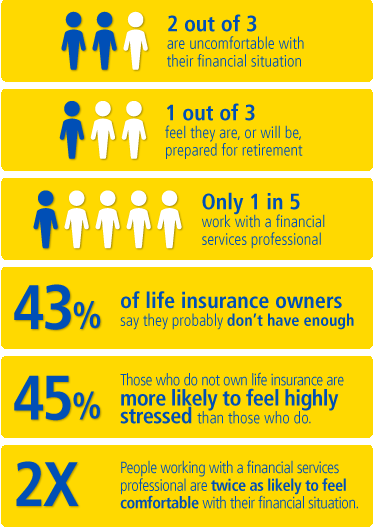
Two in 3 Americans are uncomfortable with their financial situation.
And most are totally oblivious to how much money they will need to spend on health care in the future. Seven in 10 people expect to spend less than 10% of their monthly retirement income on medical and dental expenses; but the real number is 30% of income needed for health care in retirement, according to The Urban Institute.
The Wellness for Life survey, conducted for Aviva, the life and disability company, collaborating with the Mayo Clinic, finds an American health citizen out of touch with their personal health economics.
Beyond the disconnect with health finance, people aren’t getting enough exercise as recommended by the Mayo Clinic, nor are people getting regular health check ups with doctors. One-half of consumers said their weight increased “somewhat or a great deal” in the past decade; only 16% said their weight fell.
Yet 23% of U.S. health citizens believe their health will improve once they retire.
By first response, people said the most important single tactic they can undertake to promote their health is:
– To lose weight, cited by 28% of U.S. adults
– To eat healthier, 27%
– To exercise more, 19%
– To sleep more, 13%
– To improve relationships, 12%.
Ipsos conducted the online survey for Aviva and Mayo among 1,500 nonretired U.S. adults in February 2013.
Health Populi’s Hot Points: People in America continue to under-estimate the amount of money required to cover future health spending. And why is this the case?
- A mass of Americans is living paycheck to paycheck, with little left to save for that rainy day — let along health spending in retirement. See more here in Health Populi and search “health cost literacy” in the blog.
- Many U.S. health consumers that have been long-enrolled in employer-sponsored health plans are used to companies playing a patriarchal role when it comes to health plan purchasing. This will change in the 4th quarter 2013 as more employees will be subject to making decisions on private or public health insurance marketplaces/exchanges.
- Some people just don’t want to spend time pondering this rather sobering issue — the way folks might not want to consider buying long-term care policies or insurance in general.
Aviva smartly collaborated with Mayo Clinic for this study, which brings together the Health = Wealth paradigm that is central to the Health Populi blog and HealthcareDIY. A growing number of U.S. health citizens have already started morphing into health consumers in 2013. By 2014, more will be forced to do so, and thinking about health spending will compete with other household financing categories like shelter, food, clothing, and energy.




 Thank you FeedSpot for
Thank you FeedSpot for